Today I’ve asked Liz from SpeechLadyLiz to share with you! She’s working in a clinic so social skills for the preschool crowd is part of her every day! I’ve been asked many times, “How do you work on pragmatics with preschoolers?” It’s hard because you can’t be as direct as you can be with older children. I work in a preschool and almost every single one of the children I work with has a pragmatic goal. Along with that pragmatic goal there are always play goals. So in my opinion, how do you work on pragmatics with preschoolers….play, play, play. I recently had a conversation with another SLP who works in the schools. She said the last thing I have time for is working on play. Everyone around us was totally bored with our conversation or otherwise I might have flipped the table over and said “What???” Play with preschoolers is probably the most important thing you can do. What can you get from play you might ask? Narration, conversational turn-taking, following directions, commenting, initiating, asking questions, awareness, inhibition, attention and the list goes on and on. I have the luxury of getting to see my kids for 4+ hours a week and 2 hours at a time, so I’m able to really bombard them with language related to our theme. I figured I’d give you all a rundown on how I work on play and pragmatics with a specific theme.
During circle time I like to go over the vocabulary and have each child repeat the vocabulary we are targeting that week. Preschoolers=visuals, so I have this visual(freebie!) below to talk about all the things we can do with the targeted toy. I also bring the toy into circle time and show them how to play with the toy properly.
Once we’ve practiced how to play with the toy in a more structured, facilitated environment, then we go to free play with the toy. I have seen a lot of carryover of the skills taught into these play sessions. The first time a child has a successful interaction with a peer and they see the importance of these interactions it’s amazing! During the free play time I like it to be more controlled by me (I’m an SLP after all) and I do that by having a focused activity.
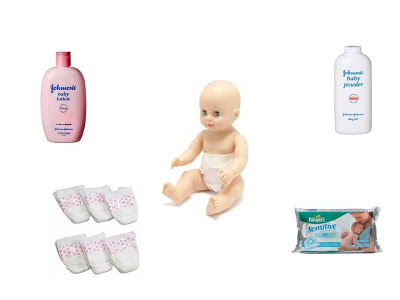
Some additional activities that are fun to do are painting with baby bottles.
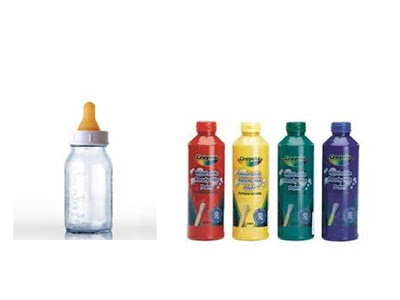
Find those directions here.
Join the SRN newsletter!

I'm so glad you stopped by! If you'd like to keep up with the newest posts and get exclusive free downloads, please sign up for the newsletter! Your first freebie is ready as soon as you subscribe and confirm your email!

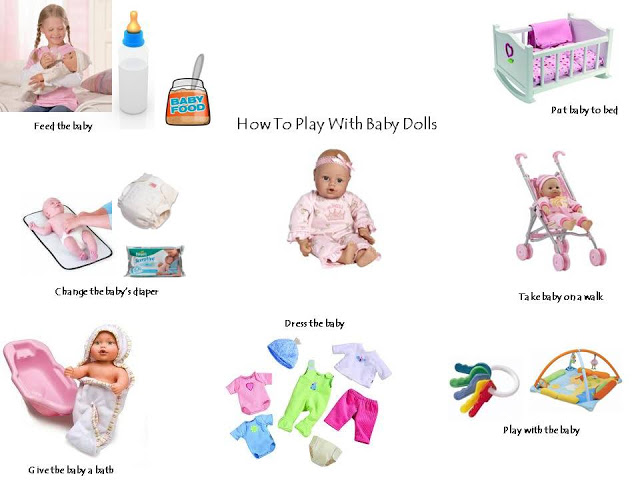
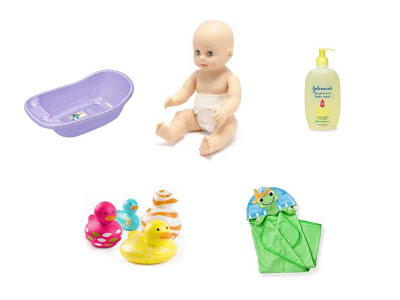
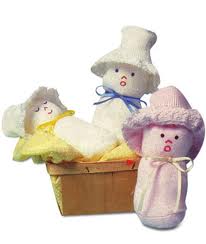

OH MY GOSH LIZ! If I overheard that conversation you had with your colleague, I might have had a coronary right then and there! Holy smokes, has someone missed the boat! Next time you can tell her/him that research shows that play facilitates: imaginative thinking and exploration, abstract thinking, problem solving and reasoning, life skills, leadership skills, communication development, social skills development, theory of mind, understanding of safety, self-confidence and a high self-esteem…AND some researchers theorize that play positively affects IQ as well! Play IS the child’s WORK! And she will MOST definitely make more progress on her goals if she is “playing”. It is NOT developmentally appropriate to expect a PK student to “sit” and participate in any structured academic (including language)activities for long periods of time. I completely agree with your strategy…you control the play by controlling the manipulatives and materials. But oh what language I suspect you hear! What problem solving! What reenactments of daily situations! ALL those goodies in one therapy session. In your colleagues defense, I really did struggle for years with trying to incorporate play into therapy as it was drilled in my head in grad school….data, data, data, get as many trials as you can…etc. But what a disservice that is when we are presenting situations that are developmentally inappropriate. I had to come to terms with qualitative data and with NOT having control over EVERY aspect of a therapy session. It isn’t easy but after much time and working with other great professionals, I got there…and the progress I’ve seen does NOT compare to drill. Thanks so much for your post. It’s great!
Wow! I loved developing play. My preschoolers loved restaurant–customer and waiter with picture menus, and they loved being the speech teacher and “reading” their favorite story and telling the others what to do with the story pieces. I think they loved giving my stickers away too…:)
What a great post! Providing only one baby doll is a great way to facilitate interaction between the children. It’s so functional for them too! Preschoolers are forever going after the same toy as their peers.
I think you make a great point too, Maria. We are always looking for that measurable piece during therapy. Although I don’t get a percentage of success when working on play, I usually make tally marks each time the child initiates, reciprocates and comments and indicate the period of time play occurred. At least this gives me some point of comparison for the following session.
Mo Lo, I take date the same way. Ha! Great minds…! I feel at the very least it does give me some hard data for the number of times child exhibits those social skills vs. the number of opportunities. I’ve also become very good at taking qualitative data as well. This I found was a must in my early years as an SLP working with insurance companies and such. In the schools I became very good at using a quick system to note the level of assistance and types of cuing strategies a child requires to participate and perform some of these social skills. I found that very useful at IEP time to explain to parents the difference between NOT being able to perform a skill and being able to successfully do so with various types of cues. I’m sure everyone probably has their own way of doing this but I think if I hadn’t needed to worry about insurance companies early on in my career I might never have thought of that. I’m not that smart. Ha!
I LOVE PLAY. Do you have goal examples…I struggle to write pragmatic goals. EEK.
Play and pragmatics are my favorite! Super nerd hear.
For emotions I like to use: “Student will increase his social communication skills by identifying and demonstrating an understanding of emotions in others in 4/5 opportunities as measured by the service provider over 3 data sessions.” For the objectives I move from identifying emotions to explaining how to identify (He’s mad because he is frowning and his eyebrows go down in the middle), to knowing how to appropriately respond.
For initiating interactions: “Student will initiate interactions with peers by appropriately accessing attention (tapping shoulder and saying name), asking questions, and making comments in 4/5 opportunities over 3 consecutive data sessions.”
Hope these were helpful!